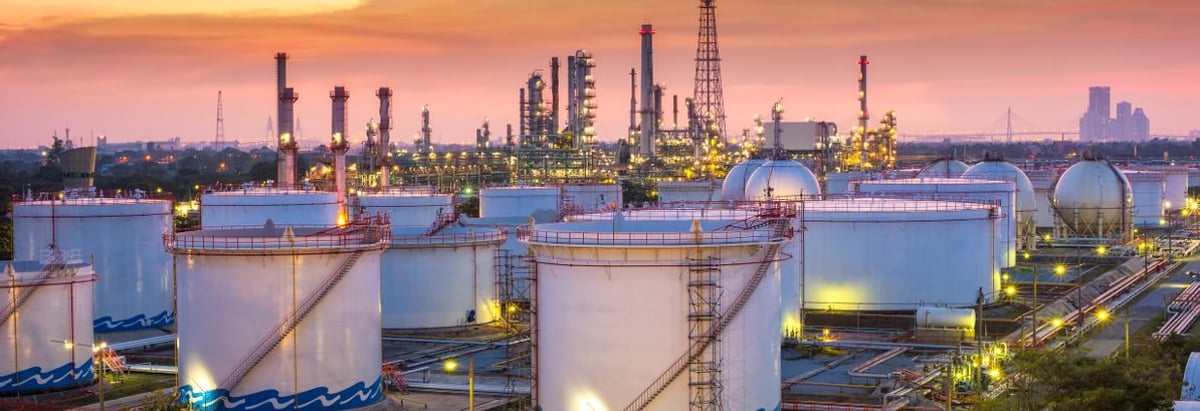Stock Analysis
- Norway
- /
- Oil and Gas
- /
- OB:OET
These 4 Measures Indicate That Okeanis Eco Tankers (OB:OET) Is Using Debt Extensively

David Iben put it well when he said, 'Volatility is not a risk we care about. What we care about is avoiding the permanent loss of capital.' When we think about how risky a company is, we always like to look at its use of debt, since debt overload can lead to ruin. We note that Okeanis Eco Tankers Corp. (OB:OET) does have debt on its balance sheet. But the real question is whether this debt is making the company risky.
When Is Debt Dangerous?
Generally speaking, debt only becomes a real problem when a company can't easily pay it off, either by raising capital or with its own cash flow. If things get really bad, the lenders can take control of the business. However, a more frequent (but still costly) occurrence is where a company must issue shares at bargain-basement prices, permanently diluting shareholders, just to shore up its balance sheet. Having said that, the most common situation is where a company manages its debt reasonably well - and to its own advantage. When we think about a company's use of debt, we first look at cash and debt together.
Check out our latest analysis for Okeanis Eco Tankers
What Is Okeanis Eco Tankers's Net Debt?
You can click the graphic below for the historical numbers, but it shows that Okeanis Eco Tankers had US$668.8m of debt in June 2024, down from US$714.1m, one year before. However, it also had US$92.8m in cash, and so its net debt is US$576.0m.
A Look At Okeanis Eco Tankers' Liabilities
We can see from the most recent balance sheet that Okeanis Eco Tankers had liabilities of US$107.9m falling due within a year, and liabilities of US$594.7m due beyond that. Offsetting this, it had US$92.8m in cash and US$34.9m in receivables that were due within 12 months. So its liabilities total US$574.9m more than the combination of its cash and short-term receivables.
Okeanis Eco Tankers has a market capitalization of US$1.10b, so it could very likely raise cash to ameliorate its balance sheet, if the need arose. But we definitely want to keep our eyes open to indications that its debt is bringing too much risk.
We measure a company's debt load relative to its earnings power by looking at its net debt divided by its earnings before interest, tax, depreciation, and amortization (EBITDA) and by calculating how easily its earnings before interest and tax (EBIT) cover its interest expense (interest cover). This way, we consider both the absolute quantum of the debt, as well as the interest rates paid on it.
Okeanis Eco Tankers has a debt to EBITDA ratio of 2.7 and its EBIT covered its interest expense 3.2 times. This suggests that while the debt levels are significant, we'd stop short of calling them problematic. Investors should also be troubled by the fact that Okeanis Eco Tankers saw its EBIT drop by 19% over the last twelve months. If things keep going like that, handling the debt will about as easy as bundling an angry house cat into its travel box. There's no doubt that we learn most about debt from the balance sheet. But ultimately the future profitability of the business will decide if Okeanis Eco Tankers can strengthen its balance sheet over time. So if you want to see what the professionals think, you might find this free report on analyst profit forecasts to be interesting.
But our final consideration is also important, because a company cannot pay debt with paper profits; it needs cold hard cash. So we clearly need to look at whether that EBIT is leading to corresponding free cash flow. Looking at the most recent three years, Okeanis Eco Tankers recorded free cash flow of 45% of its EBIT, which is weaker than we'd expect. That's not great, when it comes to paying down debt.
Our View
We'd go so far as to say Okeanis Eco Tankers's EBIT growth rate was disappointing. Having said that, its ability to convert EBIT to free cash flow isn't such a worry. Looking at the bigger picture, it seems clear to us that Okeanis Eco Tankers's use of debt is creating risks for the company. If everything goes well that may pay off but the downside of this debt is a greater risk of permanent losses. There's no doubt that we learn most about debt from the balance sheet. But ultimately, every company can contain risks that exist outside of the balance sheet. For instance, we've identified 2 warning signs for Okeanis Eco Tankers that you should be aware of.
If, after all that, you're more interested in a fast growing company with a rock-solid balance sheet, then check out our list of net cash growth stocks without delay.
New: AI Stock Screener & Alerts
Our new AI Stock Screener scans the market every day to uncover opportunities.
• Dividend Powerhouses (3%+ Yield)
• Undervalued Small Caps with Insider Buying
• High growth Tech and AI Companies
Or build your own from over 50 metrics.
Have feedback on this article? Concerned about the content? Get in touch with us directly. Alternatively, email editorial-team (at) simplywallst.com.
This article by Simply Wall St is general in nature. We provide commentary based on historical data and analyst forecasts only using an unbiased methodology and our articles are not intended to be financial advice. It does not constitute a recommendation to buy or sell any stock, and does not take account of your objectives, or your financial situation. We aim to bring you long-term focused analysis driven by fundamental data. Note that our analysis may not factor in the latest price-sensitive company announcements or qualitative material. Simply Wall St has no position in any stocks mentioned.
About OB:OET
Okeanis Eco Tankers
A shipping company, owns and operates tanker vessels worldwide.


